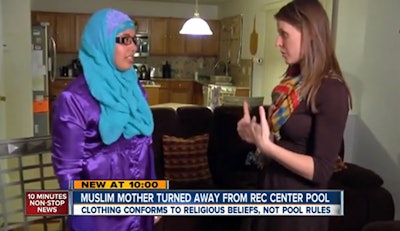
It's an age-old issue for pool managers: what is appropriate swimming attire?
Much to the dismay of Sabah Ali, the Commerce City Recreation Center outside of Denver, did not allow her to swim while wearing clothing that conforms to her Muslim beliefs. Ali was wearing what she called an "Islamic dress" with a shirt and pants underneath.
"Why do I have to be half naked to swim?" Ali asked in an interview with ABC 7 News in Denver. "I want to have the same rights as every citizen."
But for the rec center, it's not an issue of discrimination, it's one of safety. As the rules clearly state on the Commerce City website, "Basketball shorts, other sportswear, cotton, or any other clothing that is not specified swimwear is not allowed."
But Ali says she has worn her religious attire in public pools before. "I told them I would take off the long dress, if that was their concern, and that I had clothes on underneath," she told ABC 7.
"The city routinely turns away people who don't have appropriate swimwear — jean shorts, sport shorts, not wearing swim diapers," says Michelle Halsted, a Commerce City spokeswoman. "We turn all those individuals away because the number one focus for us is safety."
As AB reported in this 2013 story about Washington D.C.'s pool dress code, inappropriate clothing in pools can "transport airborne and ultimately water borne contaminants into the pool." And "materials such as cotton can break down in the water and cause fibers to clog filters."
Not to mention, loose clothing can make swimming more difficult.
In Ali's case, she ended up renting a hotel room so she and her family could use the hotel pool. Meanwhile, Halsted says the city is going to update its swimwear brochure to list appropriate alternative swimwear options such as full body swimsuits and burkinis.
But the dress code debate, especially for people of Muslim faith, is an ongoing issue for pool managers. Back in 2009, the issue was the subject of this Athletic Business feature story.
As author Nicholas Brown writes:
It is widely acknowledged that people of Muslim faith represent one of the fastest-growing population segments in the United States and Canada. Less appreciated, according to some experts, are their recreation needs.
A glaring example is women's swimming. According to most interpretations of the tenets of Islam, Muslim women are not to be in public without hijab (head and hair coverings and loose-fitting, modest dress that leave only the hands, feet and face exposed). For safety reasons, the practice is certainly not conducive to swimming. And for particularly conservative Muslims, the idea of donning tight-fitting swimwear in a public recreation environment is almost unthinkable.
As Brown cites in the article, some communities have developed specific swimming classes for women of Muslim faith.
"It makes sense for business and service providers to accommodate the needs of the community," said Salman Shiekh, a native of Pakistan who helped lead the effort to make one such class possible. "All it takes is dialogue to make it happen."
It appears we still need more of that dialogue today, five years later.
RELATED: Tankinis In, Tube Socks Out in D.C. Pools Dress Code





































